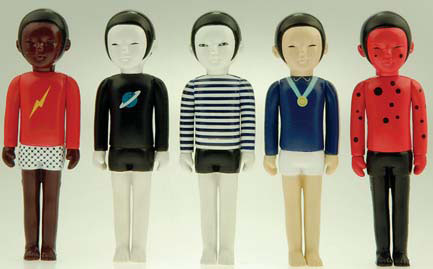Ties bind China and Germany
Updated: 2012-02-24 13:22
By Chen Nan (China Daily)
|
|||||||||||
 |
|
The installation Perk by Jin Ningning and Si Wei is one of the avant-garde works presented during the Chinese Culture Year. Provided to China Daily |
To celebrate the 40th anniversary of Sino-German diplomatic ties, a Chinese Culture Year was launched at the end of January in Germany.
The yearlong event features the history of Chinese art and culture by introducing Chinese music, film, opera, literature and other exhibitions to German audiences - and more avant-garde offerings.
For example, the opening ceremony, performed by the China Philharmonic Orchestra, was conducted by Yu Long at the Konzerthaus on Gendarmenmarkt in Berlin.
It was an audacious rendition of the Peking Opera The Drunken Concubine and a reinterpretation of Richard Wagner's Tannhauser.
"German classical music is among the most performed in the world. So it's a challenging task to present today's Chinese music to German audiences," Yu says.
The 48-year-old musician began his music studies at the Shanghai Conservatory of Music and concluded them at Hochshule der Kunst in Berlin.
On May 18, Yu will cooperate with Munich Symphony Orchestra to perform an adaptation of Austrian composer Gustav Mahler's Das Lied von der Erde, or The Song of the Earth, by Chinese composers Ye Xiaogang and Chen Xiaoyong.
From 1908 to 1909, Mahler composed this piece based on seven Tang Dynasty (AD 618-907) poems. Mahler was attracted by the vision of earthly beauty expressed in the verses and chose seven to set to music.
"I tried to translate the work into Chinese, but I didn't know who wrote the poems," Yu says. "Then a professor from Peking University helped me and I learned that the poems were from poets Li Bai and Wang Wei."
In 2005, 98 years after the initial performance of Mahler's version, Yu and China Philharmonic Orchestra invited Ye to recreate The Song of the Earth using the same texts.
"Ye uses many Chinese percussion instruments in his piece. If Mahler's version is an oil painting, Ye's is an ink-and-wash," he says.
As the music director of the Year of Chinese Culture in Germany in 2012, Yu will return in the summer to lead more Chinese orchestras at the Schleswig-Holstein Music Festival.
In addition to musical events, more than 1,500 artists and scholars will attend events at the Year of Chinese Culture in Germany. Public forums will also be arranged. Cultural talks will be held at Confucius institutes.
One project, China! China? China, will be held in six German cities, including Hamburg, Dusseldorf, Leipzig and Munich. It will bring together Chinese artists and scholars to talk about poetry, music, dance, film, fashion and philosophy in a pavilion made of bamboo, designed by Chinese architect Liu Jiakun.
Fan Di'an, director of the National Art Museum of China, says three solo exhibitions by Chinese artists Xu Jiang, Zeng Chenggang and Yin Xiuzhen will also take place.
"Interactions between the two countries are increasing. Despite cultural differences and some misunderstandings, we will further understand each other through those cultural events," Fan says.
Moreover, Germany is currently staging the exhibition The Art of the Enlightenment at the National Museum in Beijing. Minister of State Pieper will attend the closing ceremony at the end of March 2012.
A large-scale public art exhibition will be held at Kassel from October to the spring of 2013. The city, known for its Kassel Documents Exhibitions, will see a comprehensive art exhibition from Chinese artists, especially young artists.
China New Design, a series of programs initiated by Beijing-based Ullens Center for Contemporary Art, gathers nearly 200 young, pioneering Chinese artists.
Renowned dramatist Meng Jinghui will lead a theater tour of Germany with six works, along with workshops and discussions.
"Cultural communication is not based on criticism. I believe that communication with local audiences gives the most direct feedback and offers us a chance to explain our ideas in the drama," Meng says.